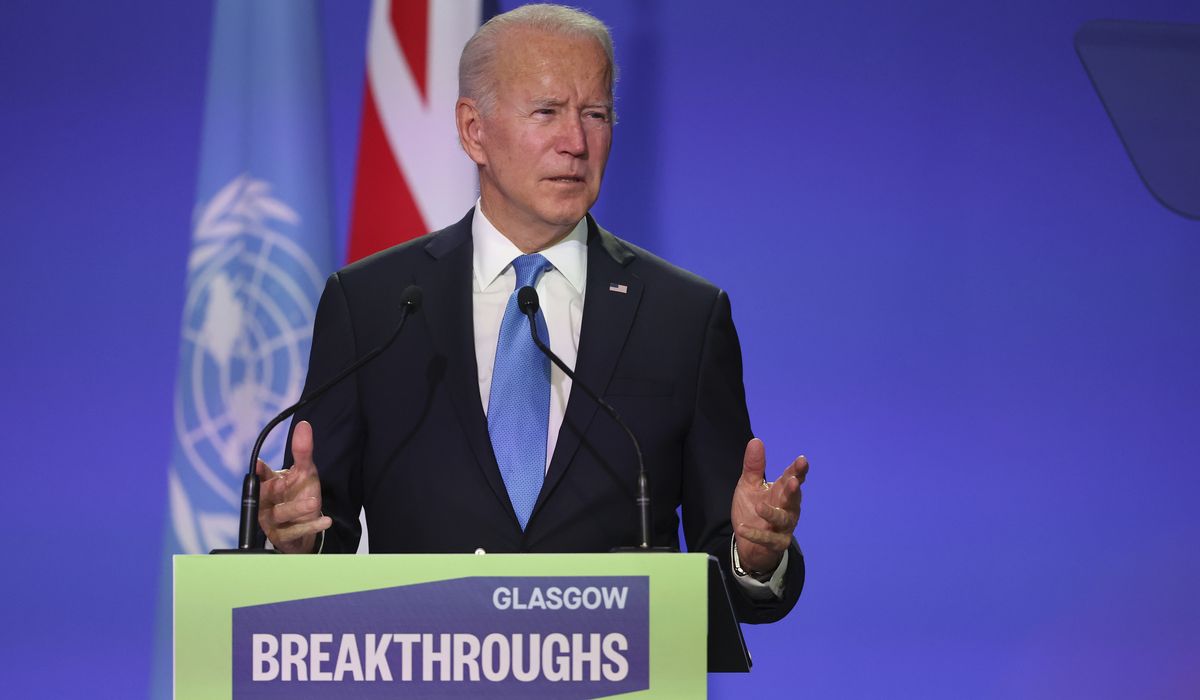
An analysis by the Tax Foundation, a nonpartisan fiscal watchdog, estimates that President Biden’s $1.75 trillion expansion of the federal safety net could kill more than 103,000 jobs over the next decade and add $750 billion to the federal deficit.
The estimate is based on a thorough analysis of the White House’s spending “framework” and the corresponding 1,684-page bill text released by House Speaker Nancy Pelosi, California Democrat. Experts from the Tax Foundation say the proposal would fall far short of White House promises.
“We estimate that the House bill would reduce long-run economic output by nearly 0.4% and eliminate about 103,000 full-time equivalent jobs in the United States,” the experts wrote. “It would also reduce average after-tax incomes for the top 80 percent of taxpayers over the long run.”
The analysis differs strongly from the rosy picture President Biden painted when he announced the deal last week.
“It’s a framework that will create millions of jobs, grow the economy, invest in our nation and our people, turn the climate crisis into an opportunity, and put us on a path not only to compete but to win the economic competition for the 21st century against China and every other major country in the world,” Mr. Biden said.
Administration officials say all of the spending programs proposed by the framework are fully funded. The White House estimates that the tax hikes included in the package would generate more than $1.995 trillion in revenue over the next 10 years.
The overall price tag of the bill is likely to change as Democrats hammer out the package.
Senate Majority Leader Charles E. Schumer, New York Democrat, announced on Tuesday a new push to include provisions allowing Medicare to negotiate down the cost of prescription drugs.
“Fixing prescription drug pricing has consistently been a top issue for Americans year after year,” Mr. Schumer said. “Today we’ve taken a massive step forward in helping alleviate that problem by empowering Medicare directly [to] negotiate prices … [and] make sure our country’s drug pricing system benefits patients, not corporations.”
Under the agreement, Medicare would be given the ability to negotiate the price of 10 life-saving drugs starting in 2023. The list of drugs eligible for negotiation would increase over time.
Seniors also would get a rebate for the price of drugs that rise higher than the rate of inflation. The deal further caps out-of-pocket costs for Medicare beneficiaries to $2,000 per year.
If the prescription drug proposal winds up being included in the final package, it is estimated to send the overall price tag soaring. Democrats are also eyeing a costly restoration of the state and local tax, or SALT, deduction, which primarily benefits wealthy individuals in blue states.
They haven’t said if the extra spending would require further tax increases to help pay for the bill.
At the moment, Mr. Biden is proposing a series of taxes on businesses and the wealthy, including a 15% minimum rate on corporate taxes and a corresponding 15% surcharge on foreign earnings. A 1% surcharge is to be levied on corporate stock buybacks.
The White House estimates that the proposed taxes would generate $800 billion.
Economists from the Tax Foundation disagree. They say the revenue estimates are off and the bill would add more than $750 billion to the federal deficit over the next decade.
“Accounting for the reduced size of the economy resulting from the tax increases, we estimate the House bill would raise in total about $615 billion in revenue … over the next decade,” they wrote. “We estimate that the bill would result in $752 billion of accumulated deficits … leading to an increase in payments to foreign owners of the national debt.”
The Tax Foundation also said Mr. Biden’s proposed tax hikes would cripple the U.S. economy as it attempts to rebound from the COVID-19 pandemic. Its analysis shows that Mr. Biden’s 15% minimum tax on corporate profits would cost Americans more than 25,000 jobs alone.
Apart from corporate tax hikes, the White House is proposing a menu of taxes on individuals.
Mr. Biden is backing a 5% “wealth tax” on those with adjusted gross income above $10 million. The figure jumps to 8% on adjusted gross income over $25 million.
“I can’t think of a single time when the middle class has done well but the wealthy haven’t done very well,” Mr. Biden said. “I can think of many times, including now, when the wealthy and the superwealthy do very well and the middle class doesn’t do well.”
Despite the rhetoric, Tax Foundation economists say, the provisions would affect all workers by killing more than 29,000 jobs.
The White House did not immediately respond to requests for comment.
The report was released one day after Sen. Joe Manchin III, West Virginia Democrat, accused his colleagues of engaging in “budget gimmicks” to hide the true cost of the spending package.
“As more of the real details outlined … what I see are shell games and budget gimmicks that make the real cost of this so-called $1.75 trillion bill estimated to be twice as high,” he said. “That is a recipe for economic crisis. None of us should ever misrepresent to the American people what the real cost of legislation is.”








